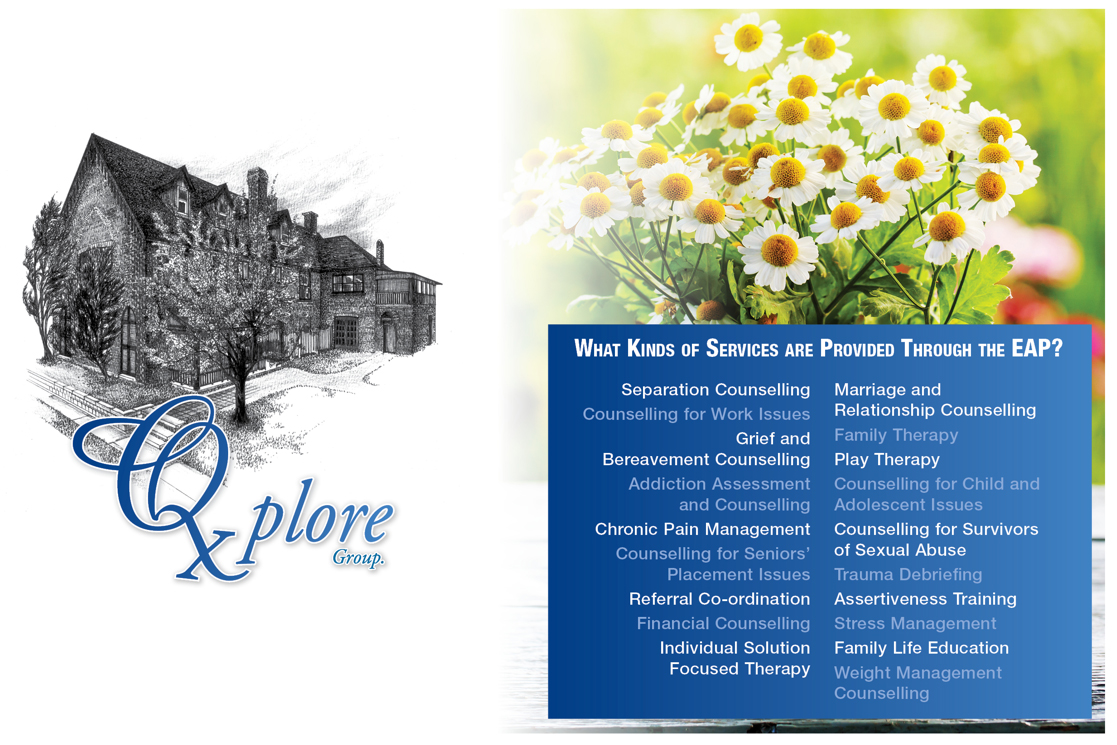Spring 2022

Creating work-Life Balance:
A 4-step Self-Care PlanBobby-Jo Kelly, M.A.,RP (Q)
Parenting Tips: Promoting and Reinforcing
Emotional Regulation SkillsTaylor Willis, M.A. RP (Q)
WELCOME TO OUR SPRING 2022 NEWSLETTER
Finally, it is Spring. Not only escape from winter but an escape from COVID too, at least by going outside. It has been a very stressful 6 months and we all deserve some relief. We need to be kind to ourselves and those around us. Give us time to heal.Bobbi-Jo Kelly who is a Psychotherapist with the EAP has some great ideas about creating work-life balance through setting up a self-care plan. This takes a little work, self and environment analysis to set up, and some discipline to maintain, but is a very worthwhile investment in building personal resilience.
Taylor Willis, also a Psychotherapist, has some parenting tips that will help you develop emotional regulation skills with your child, particularly if they are having trouble coping or having temper tantrums. If you or a family member are having personal or relationship difficulties, then your Employee Assistance Program is available to both you and your immediate family members. We can assist with parenting; communication; trauma and grief; relationship issues; stress, anxiety, and depression; financial issues; work issues; and loss or bereavement. We provide services both in person and virtually, whichever you prefer, just give our Reception a call.CREATING WORK-LIFE BALANCE: A 4-STEP SELF-CARE PLAN Bobbi-Jo Kelly, M.A.,RP (Q)

QUINTE COUNSELLING SERVICES INC.

A 4-Step Process in Creating a Balanced Self-Care Plan
1. Inventory Current Self-Care Strategies
Firstly, let’s do some inventory. Figure out what your current self-care strategies are, then assess what areas in your life are needing more attention. Assessing your needs can be as simple as creating a list of your different self-care practices and separating them into the different components of wellbeing. This will assist in visualizing where you may be lacking self-care to create overall balance. You may already be practicing self-care without even realizing it! Self-care doesn’t always have to be an additional practice such as going to an expensive spa, planning a date with friends, or pampering yourself, if you are being mindful of your own needs, take the time to tend to those needs, and promote your own health and happiness. Self-care looks different for everyone.
2. Self-Care Proposal
Secondly, create a self-care proposal or plan that best fits your schedule and needs. Identify activities and practices that support your well-being and help manage and sustain positive self-care long-term.Physical Care
It’s important to take care of your body so it runs more efficiently. When you are kind and gentle to your body, it will be reciprocated. The mind and body connection is powerful. Moving and fueling your body will improve your brain functioning and allow you to feel stronger and happier. Your physical needs include physical activity, regular sleep, healthy diet, regular healthcare appointments, and taking medications as prescribed.Psychological care
Psychological care is one of the most important dimensions when looking at your holistic well-being both as a useful self-care coping tool and as an effective preventative measure. However, psychological self-care can be a difficult practice to implement given its intangible complexity. Psychological self-care involves engaging in practices that allow you to stay mentally sharp and happy. Self-compassion, acceptance, and mindfulness are all powerful tools to help maintain a healthy mind. Mindfulness is an increasingly popular self-care strategy in the western world. It is the ability to maintain awareness and openness to experience, including internal mental states, without judgement and with acceptance. A tool called Mindful Breathing is a basic strategy you can start with to begin your journey in mindfulness. This practice is easy to learn and produces many benefits such as reducing the risk of mental health illnesses, decreasing stress, and improving focus and concentration. Therapy is also beneficial when it comes to improving psychological care and well-being. During therapy, the therapist can help you gain a better sense of control over thoughts, feelings and emotions that may seem overwhelming. The therapist can teach you the basic principles of psychological care and provide guidance and techniques in applying these principles outside of the therapeutic environment.Social Care
Relationships and social interactions are essential in maintaining well being and a healthy and happy lifestyle. Spending time with close friends and family can significantly shift overall mood and assist you in feeling more grounded. As human beings, we have an innate need for close connections. But cultivating and maintaining good relationships takes time and energy and it takes both to tend to our social needs, foster human connection, and develop meaningful relationships that aid in healing and internal alignment.Emotional Care
Emotional self-care means understanding and nurturing your feelings, taking control of your conscious inner state, and processing internal emotions. Being mindful of your mood and behaviours will allow you to assess the need for changes and prompt you to practice self-care activities when you start feeling stressed or a little down. These practices can include deep breathing, listening to music, spending time in nature, journaling or practicing mindfulness. The benefits of maintaining good emotional care include stress reduction, improved self-regulation, increase in productivity and emotional stability.Professional Care
Workplace or professional self-care is critical. We often practice self-care outside of work given the nature and convenience of self-care activities. However, for many people, work is intertwined with their life routines particularly given the new stressors from COVID-19. Even before the pandemic, burnout was on the rise because of increased job demands and workplace stress that was not successfully managed. According to the World Health Organization (2019), burnout is characterized by three dimensions; feelings of energy exhaustion or depletion; increased mental distance from one’s job or feelings of negativism or cynicism related to one’s job; and reduced professional efficacy. To counteract the possibility of burnout set work-life boundaries, reach out for support from colleagues, leadership, or your EAP Therapist, take exercise breaks, or even change the set-up of your workspace office to improve the overall feeling of the space.3. Self-Care Slide Warning Signs
There are common warning signs that surface when your self-care practices start to decline. These warning signs include lowered ability to focus, lowered memory recall, becoming easily irritable, decreasing motivation, burnout, fatigue, and physical or mental health problems. When these signs appear there has been a self-care slide. It’s important that you allow yourself to notice these warnings signs and then re-visit and implement an improved self-care plan.4. Strategies to counter self-care slide
To reduce the risk of a self-care slide, you can do things such as regular selfcare check-ins or maintenance, create accountability with close friends or family members, adjust self-care plan when needed, ensure that the self-care plan is realistic to current lifestyle, and lastly, act as soon as you notice a selfcare slide to avoid a detrimental total loss of self-care practices. Improving self-awareness and mindfulness throughout your self-care plan will help prevent a self-care slide. Self-care is about keeping yourself well, so it is essential that you are prioritize your self-care plan to maintain good health and well-beingBobbi-Jo Kelly, M.A., RP(Q) is a Registered Psychotherapist (Qualifying) who provides services through the EAP and privately. Bobbi-Jo’s areas of strength include psychotherapy to address trauma, stress and anxiety, strengthening relationships, and enhancing existing life skills. Bobbi-Jo has a particular interest in working with depression, eating disorders and family conflict.
QUINTE COUNSELLING SERVICES INC.

Parenting Tips: Promoting and Reinforcing Emotional Regulation Skills Taylor Willis, M.A. RP(Q)
 Being able to positively, successfully, and productively regulate one’s emotions starts when a person is young and continues through adulthood. Identifying and managing emotions is important and affects how the person reacts to stressful, emotional, and anxiety producing situations. A child learns how to handle these stressful situations and emotions through observing their parents or guardians.
Below are some tips to help your child develop positive emotional regulation.
Being able to positively, successfully, and productively regulate one’s emotions starts when a person is young and continues through adulthood. Identifying and managing emotions is important and affects how the person reacts to stressful, emotional, and anxiety producing situations. A child learns how to handle these stressful situations and emotions through observing their parents or guardians.
Below are some tips to help your child develop positive emotional regulation.
Reflect on your own emotional regulation skills and model the way you want your child to respond.
Children are constantly watching the people around them, copying what they are doing and taking on those behaviours as their own. Reflecting on one’s own skills to make sure they are what you want to show your child and then demonstrating those skills, will give your child examples of what do in situations that trigger emotions. If you feel you are lacking in emotional regulation skills, or if you need improvement, seek help for yourself to learn and continue healthy practices and break any generational cycle of unhealthy parenting.Observe and take note of situations that are emotional triggers for tantrums.
When a child is having troubles or a tantrum take note of what is happening, the triggers and the environment. Think about what can be done differently next time, what could help the situation, and what can you do to help the child get through to the other side of the outburst and back on track.Let your child’s emotions flow and be there for them.
A lot of parents try to shut down their child’s emotions because they are worried about judgment from onlookers who might think that the parent doesn’t know how to deal with the situation. Making comments like “There is no reason to cry” or “stop that it is all done”, may seem harmless, but to the child it might be invalidating them or making them feel not heard. Think of your child’s perspective and name and validate their feelings. Even though it is a challenge, allow your child to have the outburst, be there for them, let them get it out, and then talk about it afterwards.Be open and talk with them about mental health.
Make sure you are open to conversations about mental health with your children. If your child feels they can talk to you about their feelings, it will make it easier to help them when they are experiencing challenging emotions. Seeing and feeling you being comfortable with mental health discussion will show your child it is okay to discuss their mental health with you when needed.Have realistic expectations of where your child should be developmentally for emotions
Take time to research what, for your child’s age, are reasonable expectations for emotional regulation capabilities and emotional intelligence. Also understand that every child is going to take their own individual time and path. Having unrealistic expectations when raising a child can cause disappointment, frustration, and impatience. Having realistic expectations for your child, and being patient, will create a positive learning environment, and enable managing behaviours in a positive and healthy way.Seek outside help for yourself and/or child if needed.
If you are feeling overwhelmed by emotions or stressful situations or seeing that your child is struggling and needs extra support, feel free to seek out outside help. Family, friends, or your EAP Counsellor are always useful resources.Taylor Willis, M.A. RP(Q) is a Registered Psychotherapist (Qualifying) who works with presenting issues such as anxiety, stress, depression, body image, communication, and post partum depression. She also provides family sessions to address parent-child and family conflict.

Did you know…
→Appointments are scheduled at a time that is convenient for you and usually within two to three days?→No one at your place of employment will know that you have used your EAP unless you tell them?
→Counselling is provided for a broad range of services, including marital and relationship; parenting; stress; separation/divorce trauma; workplace; and personal issues?
→Counsellors can help you access community resources and support groups?
→A comprehensive description of the services provided through your EAP is available through your EAP brochure or on our website at www.qxplore.com?
QUINTE COUNSELLING SERVICES INC.


***PSYCHOEDUCATIONAL ASSESSMENT SERVICES***
Are you a worried parent whose child or adolescent is experiencing difficulty with:
- * Early Childhood Development?
- * Autism or Behavioural Issues?
- * Not achieving at the expected level, or motivation, paying attention and concentration?
- * Managing emotions and getting along with others?
- * Transitioning to College or University?
A Psychoeducational Assessment can identify causes of your child’s problems and recommend what can help.
***PSYCHOLOGICAL ASSESSMENT, TREATMENT AND BEHAVIOURAL SERVICES***
- * Private Insurance
- * Autism and Behavioural Services
- * Employment Accommodation
- * Veterans Affairs
- * Health Canada
- * WSIB
- * ODSP
Lynn Andrews, Ph.D., C.Psych.; Laura Campbell, M.A., BCBA; Tamara Davidson Marcon, M.A ; Riley FoxCassibo, M.C., RP; Jennifer Gaddes, M.A., C.Psych. Assoc.; Shara Highgate, Ph.D., C.Psych.; Michelle Holloway, BCBA, MADS; Sheelagh Jamieson, Ph.D., C.Psych.; Jessica McNiven, MPEd; Eva Mourelatos, M.A., RP; Erika Portt, M.A.; Anita Ramani, Ph.D., BCBA-D, C.Psych.;Kim Trudeau Craig, M.SC., RP, BCBA; Mike Williams, M.S., BCBA
Quinte Assessment and Treatment Group Inc.
Quinte Counselling Services Inc.
208 John Street Belleville, Ontario, K8N 3G1 Tel: 613-966-4262 Fax: 613-966-4265 Toll Free: 1-800-527-7793 qcs@qxplore.com www.qxplore.com
QUINTE COUNSELLING SERVICES INC.

